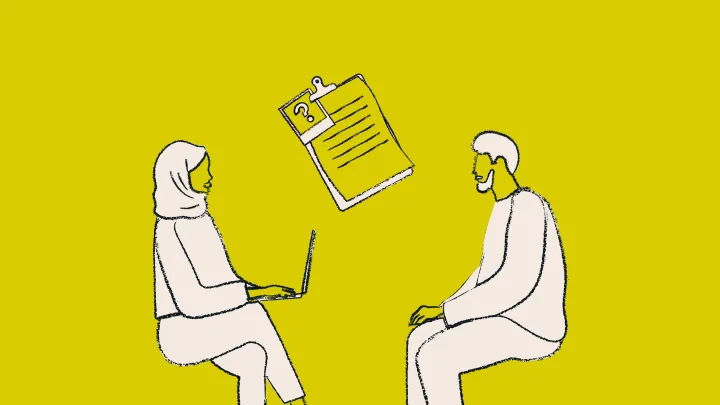What to do after hiring the wrong person

Hiring is hard. Sometimes, we get it wrong – and end up making a bad hire who doesn't fit the role. Here's what to do next.
Hiring is an antiquated system, filled with inexact expectations and pushy recruiters. What’s more, the whole endeavour is propped up on an absolute fantasy - the delusion that you could possibly get to know a candidate after what is, at best, a couple of hour-long meetings.
It is in no way an exact science .
There’s no set of rules to follow, no algorithm that holds the secret to choosing the perfect candidate. Most of the time, the best hiring process in the world consists of a knowledge of your company and your own gut instinct.
So you have to be prepared for the times you make the wrong hire.
Give yourself time with the right probation period
Probation periods aren’t the sexiest thing in the world, but they really are so important. They serve as an extended interview; an opportunity to see how a new employee fits within your company culture so you can catch any mismatch before it's too late.
The two most pressing questions I have of every new hire are “do they deliver what we need?” and “do they fit our company culture?”. But those two questions are almost impossible to answer off the back a couple of hours of interviews. A probation period gives you time to find out.
When thinking about probation periods, here’s what’s on our radar:
- How long is too long? In our view, one month is too short, but six months is overkill. Set a six month probation period and the new hire will feel untrusted - the cards are stacked against them. Three months tend to be just right.
- Once you’ve got your time frame set, book in regular catch-ups during that period with the team member to review their performance as part of the employee onboarding process. Not passing your probation period should never be a surprise.
If you're still unsure about how long probation periods should be at your company, you can also get help from an HR professional to guide you through the process.
It's absolutely normal to express doubts about probation, whichever role it is, and that's why our team of experts is here to support you.
Listen to the new hire, and make their onboarding a priority
Feedback is never a one-way street. It's not just how you are perceiving the situation that matters; the new employee will inevitably have an opinion on how things are progressing.
Feedback is a massive topic, and one that I won't go into too much here – but if you want to make sure you're really optimising the conversations you're having with your team, check out this 4-part post I wrote diving deep into how to give truly great feedback.
It is the hiring manager's responsibility to give this person the absolute best chance to succeed in their new role. So if there are any internal blockers within the company, or any work issues that the new hire could be helped with, then you need to identify and fix them. You need to make sure you get their onboarding right, so they have everything need to hit the ground running.
The best possible scenario here is that the new employee turns out to be the right person for the job. The time and money you've invested into this process is already a sunk cost - not to mention the emotional turmoil caused by having to fire someone. So - as much as you can - put the time into making this work.
You realise that you've hired the wrong person. What now?
This is the part I hate.
You’ve got someone in – but after some warning signs, doubts have started to surface. You’ve invested plenty of time in trying to make it work, but for whatever reason, it’s just not happening and the red flags make it evident that you've hired the wrong person.
This is a dangerous place to be. It’s easy to get stuck here - bogged down “maybes”, wondering if it might work out.
But if you’re doubting a new team member that early on, then the chances are that things aren’t just going to work out. Particularly if the reason is related to company culture or a negative attitude.
So… lean into the doubt! Trust your gut.
It’s important to give yourselves time to discuss these decisions internally with the hiring manager. You don’t want to rush things, but once you get to the point where you’re sure, then act fast. There are a few reasons for this:
- It’s not fair to leave a bad hire in a role you know they’re not going to have much longer. Give them the best chance of moving on to a new role where they’re more likely to excel.
- Moving people in and out of a team is never easy, so announcing it to the rest of the team and getting on with it ensures you’ll get back to where you were faster.
- The bottom line here is that the longer you stall, the longer it will take to find a replacement - and most likely, dragging out one bad hiring decision is just taking up valuable headspace.
Firing someone is a hard thing to do, and it’s going to be upsetting for both sides. Let the person say their piece and explain your reasons as clearly and calmly as you can.
In almost all cases, the decision is going to be mutually beneficial in the long-term - if only because you both learn a hard lesson.
Of course, you don't have to be alone in making these tough decisions. Our team of HR experts is here to give tailored advice in the moments you need it the most.
Remember - you have a duty to the rest of the team
It’s also worth bearing in mind that if you’ve noticed something is wrong, then it’s likely that the rest of the team have as well. You have a duty to be an attentive and proactive leader - the impact of a bad hire has the potential to be really damaging to team morale. There is nothing more frustrating for the rest of the team than to see averageness or under-performance allowed to go unchallenged.
Just remember that while the way you behave in this situation will shape your team’s understanding of you as a person, no one is expecting you to be Superman. Once it’s done, explain your reasoning (if appropriate), be open to questions, share any learnings and then move on.
Turning hiring mistakes into a better recruitment process
The emotional and financial cost of a bad hire can be pretty significant, so it's natural to want to move on as quickly as possible. Don't do that. There’s one more thing you have to do.... the post-game analysis.
Everyone agrees that you should “learn from your mistakes”, but that’s something of an empty platitude. You don’t learn from vague generalities - you learn from uncovering exactly what went wrong.
First of all, break down the recruitment process into its individual components:
- The job description posted on job boards
- The interview process
- Any skill assessment/tech test
- The onboarding process
- The firing process
Bring together your leadership team and discuss any issues or concerns you have with each of these stages. Build out any learning curves you can draw from it, and take action to ensure that those hiring mistakes don't happen again. The biggest single benefit you can take from this negative experience is improving your hiring process, so that next time you get the right candidate.
Even hiring mistakes can have silver linings
This is a rubbish experience, and it's likely to end in a few uncomfortable conversations. There are no two ways about it. You’ve made a mistake and now it’s going to cause anguish for all involved.
While that is incredibly frustrating, I’ve never regretted a hiring decision. Each hiring process has broadened my understanding of how to pull together the right group of people and build a company culture that I am proud of. It fine-tunes your ability, and that is the silver lining.Charlie’s HR Advice service is the most affordable HR support for small businesses option on the market, and has been designed specifically with small businesses in mind. To learn more, book a free call by clicking this link.



